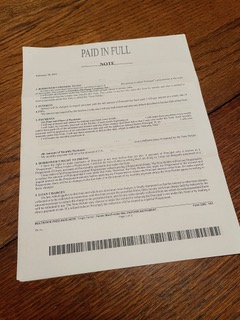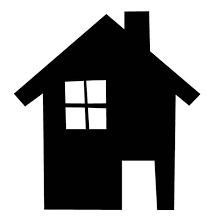We had a goal to pay off our house early when we set out to buy our first home. We were able to pay it off early, 8 years after we bought it! It was actually 7.5 years to be exact. We bought in early 2014 in the north Dallas area. We did what many don’t do in that we waited for the house to be paid off in order to start doing a full renovation of our 1950’s home. That means we paid down the mortgage habitually every month. Here’s how and why we paid off our house early.
The Goal and Vision For A Paid Off House
We had a goal to pay off our house early when we set out to buy our first home. This was determined through a lot of preparation and planning based on what we wanted our family’s future to look like. First, we don’t like debt and wanted to own a house outright. Second, we did a lot of house looking and narrowed down the areas we wanted to buy in. This was based on areas with good starter homes that we could save 20% of the purchase price of the home. Also, we wanted to be close enough to where the digital marketing/tech jobs were in DFW. We determined that we could buy a good starter home in an area that fit this criteria and our goal was to have a $100k mortgage, this was based off of the research for the specific markets we looked in.
We chose a goal of a $100k mortgage for a number of reasons. It felt more manageable and achievable to pay off a mortgage with only a $100,000 loan. At the time when we bought the house, both me and my wife worked. But we knew we wanted to have the option for her to stay home if she chose to do that. Because of this we budgeted on my income and saved, invested, and did extra things on her income. This is how we were able to save up the down payment of $60,000 for the home fairly quickly.
We knew that the luxuries of a double income no kids house would soon dry up and I in particularly could visualize paying off at least $10,000 toward principal every year. I had always had a tremendous ability to live on less. So I thought, at a minimum, worst case scenario was we could have the house paid off in 10 years. Best case scenario would be to have it paid off in 5 years, especially if my income went up. But I had a lot of work fluctuation working in digital marketing and so I wanted to make sure I was not depending on my income to go up. Fortunately we did this because for several years my work income did not go up.
I did have a side gig where I taught as an adjunct professor one night a week. We put all of that income toward the house. So, when there were years that we did not have any extra, I still saw a good chunk of the principal come down.
When you look at buying your first house, your numbers will be different. Your work opportunity and challenges will be different. It’s important to determine what is most important to you today and in the future, when it comes to your home. Everyone’s situation is a little different. We wanted to make it possible for my wife to stay home with kids. We had to plan for that otherwise it would have been a lot more of a struggle. During our years of work challenge, we were thankful that even when money was really tight, we always made our payments because we had planned to live on one income.
Also, I wanted a paid off house because I was interested in business ideas and I wanted the freedom to choose the kind of work or lifestyle I wanted at some point in the future. I also had determined that as I got older I wanted more work flexibility. With a paid off house, it would mean that I would have room for personal projects and I could turn my attention more to investing rather than simply being dependent on income from one employer.
Making these decisions early on in what was important to us impacted how we spent and saved and invested our money early on. I didn’t want to spend my whole working life just trying to get ahead. I just wanted to hit a goal to have all expenses paid for. Along the way I found there is a process to gaining more money freedom by being able to gradually choose your money, time, and resources.
Ways to Visualize the Steps to Pay off the Mortgage
One easy way to visualize the importance of paying down debt is by using the amortization schedule to your advantage. You will see that there is a lot more interest paid at the beginning of the mortgage loan. When you put an extra $1,000 or more on the principal, you see the amount of amortization payments go down a lot more. We had 7 pages worth of amortization payments. We would cross out each one as we made payments and as we put more principal on the loan. That means, whenever we paid a lot of principal in a month, especially in the early years of the mortgage, we would get to strike through more lines. This might sound cheesy but it is very rewarding. Once we reached the last line of a page, we would put a big X through the whole page and do a little mini celebration. This gave us tremendous motivation.
Secondly, because our mortgage loan was only $100,000, I would use my 5 fingers as a way to countdown to our debt freedom. Every time we paid off $10,000 of the loan, I would decrease a finger. This made the whole process feel very attainable, to focus on getting the next $10,000 paid down.
Along the way, we definitely had periods where we considered stopping this process and just building up our savings as much as we could. But, because we had already paid off so much, we knew that we would not get to realize the benefit of what we were doing until the house was fully paid off. Meaning, it would feel like we doubled in income once we were done because we were putting the extra money on the mortgage. To stop would mean that we would have a little extra every month rather than a lot extra every month.
Don’t Give Up On Your Goals and Dreams
As I mentioned we had some challenges with my work income along the way. At times we considered moving to a place with a lower cost of living, outside of the city. We could do this because our house went up a significant amount after we bought it. Our market has been going up every year since we bought it. We are blessed and thankful for sure. But, as nice as it sounded for us to sell the house and move, in the end, that was a last resort. We would have been retreating, throwing up the white flag, so to speak, and we never felt right about that so we just continued pursuing the financial goal. In the end, we knew that paying off the house would give more flexibility in my choice of job and career. And, if I needed to make a change, we would be able to do it then.
This mentality really allowed me to not give up when it came to my work or this goal to pay off the house. I knew that God was in this plan because I did not quit and every time I thought about not paying extra on the mortgage or quitting my job and leaving the city, I just did not have peace.
What happened instead of me needing to switch careers, is that my career opportunities slowly got better and better. As I grew in patience, in self control, in my love for God and for others, my mindset around work completely changed. There was a significant amount of spiritual formation going on in me and my heart in the early years of marriage and then into having kids. This process of growth showed me that there are times when spiritual formation and work formation might seem slow, but when you have a plan and a purpose and you are asking God to guide and direct to the results that he wants, you will see the fruit of those efforts if you persist.


